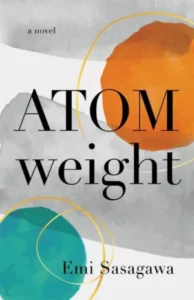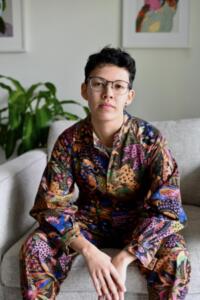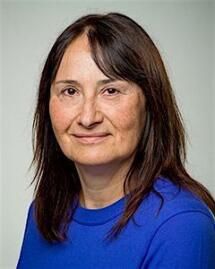1847 Coming out swinging in London
Atomweight
by Emi Sasagawa
New Westminster, BC: Tidewater Press, 2023
$22.95 / 9781990160165
Reviewed by Candace Fertile
*
 Emi Sasagawa’s debut novel, Atomweight, tackles a number of important issues such as racism and homophobia through its central character and narrator, Aki, who leaves familiar privilege in West Vancouver to attend London School of Economics. Her privilege continues, but so do her problems.
Emi Sasagawa’s debut novel, Atomweight, tackles a number of important issues such as racism and homophobia through its central character and narrator, Aki, who leaves familiar privilege in West Vancouver to attend London School of Economics. Her privilege continues, but so do her problems.
With a Japanese-Canadian father and a Colombian mother, Aki straddles two or even three cultures without fitting smoothly into any. She dislikes thinking of herself as “mixed,” even though it’s a word she uses to describe herself. And while she has known for ages that she is gay, she has kept that fact a secret from her parents who believe that homosexuality is wrong. Going to London affords her a freedom she hasn’t known in Vancouver. Distance, however, doesn’t solve any problems. It creates new ones.
The novel opens with a Prologue that recounts a deeply disturbing incident six months into Aki’s stay in London. At a pub, a young South Asian man tries to chat up Aki. Alcohol does not help the situation. The man makes an offensive comment about lesbians. Aki, who is 5’4” and a hundred pounds, attacks him. As she explains, “In that moment, this stranger embodied all my anger and hurt.” The narrative then moves back in time and outlines how Aki gets to this point of thinking that beating up odious men, even when they deserve some kind of punishment, is a good way to cope.
Perhaps it’s too obvious to say that young people can make some stupid decisions on the path to independence and maturity, but what’s frustrating about Aki is that she is smart and knows her behaviour is destructive. And yet she continues. Her pain about hiding her sexuality from her parents is palpable, and when the secret is revealed, their rejection of her is awful. At least she has her younger brother Haru on her side. Haru has girlfriend problems, and Aki sees clearly that Becca is not good for her brother and tells him, a circumstance at odds with her own terrible choices regarding romance.

In Vancouver-based Sasagawa’s hands, London is a swirl of classes and socializing. Copious amounts of alcohol are consumed, and sex—both meaningful and not—is a feature. Aki’s main friends in London—Abigail from Venezuela and Ginika from Nigeria—are also wealthy. Money is no issue for these young women, and they partake in a lifestyle most students see only on television. Oddly, perhaps, that is the most jarring aspect of the novel for me. While the characters recognize they are privileged, they don’t really know. And how can they? When Aki finally meets some people who struggle financially, the story takes an odd turn as there’s no reason why she would be invited to dinner at their house when they are dealing with a family crisis.
It takes a certain amount of patience to stick with Aki’s story; she seems so determined to hurl herself from one damaging decision to another. The language of the novel captures the speech of these young people, with lots of swearing and a non-stop focus on appearance. Skin, hair, meals, and clothes are constantly noted. Aki says things like “Here I was thinking London had helped me be in control of my narrative.” She also includes many references to what she is reading in her courses, as she is not a lightweight academically. She has been raised to be a good student, and she wants to continue being one. But she makes life so hard for herself.
Sasagawa addresses the grave issue of both personal and familial acceptance. And the overall culture of consumerism and consumption backgrounds the novel effectively. But Aki seems more like a cipher for issues than an authentic character. And the conclusion of the novel where Aki comes to terms with her actions and their effects strikes me as rushed and too tidy. Nevertheless I expect some young person with similar issues will find the novel a solace as it delineates the very real suffering of a young woman who is just trying to learn how to be herself—and to be accepted.
*
 Candace Fertile has a PhD in English literature from the University of Alberta. She teaches English at Camosun College in Victoria, writes book reviews for several Canadian publications, and is on the editorial board of Room Magazine. Editor’s note: Candace Fertile has recently reviewed books by Patti Flather, Peter Chapman, Janie Chang, Pauline Holdstock, Ava Bellows, Beth Kope, Geoff Inverarity, and Angélique Lalonde for BCR.
Candace Fertile has a PhD in English literature from the University of Alberta. She teaches English at Camosun College in Victoria, writes book reviews for several Canadian publications, and is on the editorial board of Room Magazine. Editor’s note: Candace Fertile has recently reviewed books by Patti Flather, Peter Chapman, Janie Chang, Pauline Holdstock, Ava Bellows, Beth Kope, Geoff Inverarity, and Angélique Lalonde for BCR.
*
The British Columbia Review
Interim Editors, 2023-24: Trevor Marc Hughes (non-fiction), Brett Josef Grubisic (fiction)
Publisher: Richard Mackie
Formerly The Ormsby Review, The British Columbia Review is an on-line book review and journal service for BC writers and readers. The Advisory Board now consists of Jean Barman, Wade Davis, Robin Fisher, Barry Gough, Hugh Johnston, Kathy Mezei, Patricia Roy, Maria Tippett, and Graeme Wynn. Provincial Government Patron (since September 2018): Creative BC. Honorary Patron: Yosef Wosk. Scholarly Patron: SFU Graduate Liberal Studies. The British Columbia Review was founded in 2016 by Richard Mackie and Alan Twigg.
7 comments on “1847 Coming out swinging in London”
A quick question to both Richard and Trevor … have you been in touch recently with the BC Labour History group? I think their readers might be MORE than interested in the podcasts and might provide some other people to interview. I am waiting to hear from them about another project, but can see some useful connections between the two. If I get a reply to my request this weekend for a new contact since the person I used to talk to there doesn’t seem to be attached to them anymore, I will let you know.
Thank you Susan. Please do keep us in the loop with how the BC Labour History group responds. For those who are interested in the Interview Series, it can be found via this link:
https://thebcreview.ca/youtube-interview-channel/